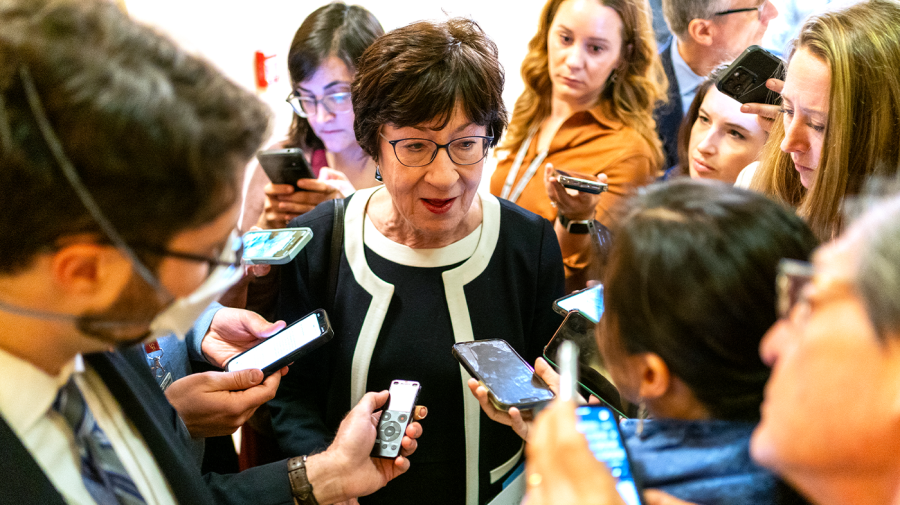Lawmakers on both sides of the aisle appeared caught off guard on Wednesday as President-elect Trump demanded that a debt ceiling hike be paired with a stopgap government funding bill, rejecting a sweeping bipartisan plan to avert a government shutdown this week.
Trump said in a joint statement with Vice President-elect J.D. Vance said that while the party wants disaster aid and support for farmers — issues that are tackled in the temporary funding plan — he wants Congress to pass a “streamlined spending bill” that doesn’t give Democrats “everything they want” and has “an increase in the debt ceiling.”
“The most foolish and inept thing ever done by Congressional Republicans was allowing our country to hit the debt ceiling in 2025. It was a mistake and is now something that must be addressed,” the statement read.
Sen. Susan Collins (R-Maine), the top Republican on the Senate Appropriations Committee, said she was “surprised” by the demand.
“This has come as a surprise to me,” she told reporters at the Capitol. “I was surprised that [Trump] wants to move the debt limit vote up to this year.
“I don’t know his rationale,” she added.
Sen. Thom Tillis (R-N.C.) said he has “no problem with doing it,” but added, “I just don’t know why Sen. Schumer would accept it.”
“It looks like June [for the debt ceiling], and so you don’t have the pressure of an impending default to get people [to raise it],” he said.
Rep. Dave Schweikert (R-Ariz.) told reporters on Wednesday that he doesn’t think the debt limit should be part of the current funding discussion.
“Stressors are almost the only moments we do difficult things. Stressors are how we built sequestration, how we did do many of these things,” he said, while also telling reporters on the matter, “without the stressor, how do you convince markets that you’re taking some of the debt seriously?”
“If you just walk away and say. We’re just raising the debt ceiling, in some ways, you pay a penalty by higher interest rates into the future,” he said. “There’s no more free options anymore.”
And in a post on X, Sen. Chris Murphy (D-Conn.) accused Trump of wanting Democrats “to agree to raise the debt ceiling so he can pass his massive corporate and billionaire tax cut without a problem.”
“Shorter version: tax cut for billionaires or the government shuts down for Christmas,” he added.
The debt ceiling puts a limit on how much money the Treasury can owe to cover the country’s bills. The national debt currently stands at more than $36 trillion.
Under a previous bipartisan plan passed by Congress to address the debt limit last year, both sides agreed to suspend the debt ceiling through 2024, kicking the task of further action on the cap to whichever candidate won the presidential election.
While the debt limit is only suspended through the end of the year, the Treasury Department has previously been able to take what it refers to as “extraordinary measures” to prevent the nation from defaulting on its debt to buy time for Washington to strike a deal on how to address the debt ceiling.
A recent estimate by the Economic Policy Innovation Center (EPIC) has gotten some attention earlier this week that the so-called “X-Date” when such measures could exhaust next year will be “as early as June 2025 and before the August 2025 recess at the latest.”
Some Republicans on Wednesday signaled openness to the idea of including a debt ceiling increase in the bill.
“I don’t like dealing with the debt ceiling, but I don’t want it to be used as a tool against President Trump,” Sen. Ted Budd (R-N.C.) also said on Wednesday.
It’s not yet clear how Democrats will respond to Trump’s proposal, though the party out of power — which Democrats would be in 2025 — often demands major concessions in return for agreeing to raise the debt limit.
Last year, Democrats insisted for months on a “clean” debt limit increase without add-ons and charged Republicans with playing with the threat of a national default. The messy showdown eventually resulted in a debt limit suspension along with a deal for caps on annual federal spending – but not without a credit downgrade from one of the “Big Three” credit rating agencies.
Some Democrats are holding off on taking a stance, for now.
“I don’t believe in negotiating with yourself. I mean, we’re now with the ball in the House’s court,” Senate Finance Chair Ron Wyden (R-Ore.) said, before expressing support for the bipartisan funding plan struck this week to prevent a government shutdown ahead of the hanging Friday deadline.
Congress came to a halt on Wednesday afternoon as Trump came out in opposition to the plan, just as lawmakers prepared to act on the sweeping package to keep the government open through mid-March, along with a host of add-ons ranging from disaster aid following hurricanes Helene and Milton, economic assistance for farmers, and healthcare provisions.
“I feel very strongly about the health package,” Wyden instead said. “I spent hours and hours, months and months … The president-elect has talked about being fiscally responsible. Our package gets money in the coffers of Medicare and taxpayers and seniors, and sure fits his bill.”
Al Weaver contributed.

